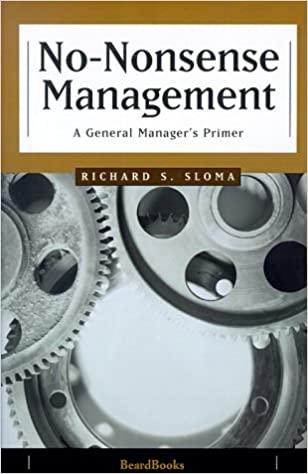Question
Food maker Neytonn controls every step in the food production process, from farming to transport to storage to processing, yet over diversification and lack of
Food maker Neytonn controls every step in the food production process, from farming to transport to storage to processing, yet over diversification and lack of synergy have plagued the conglomerate for years. CEO Warren Staley is looking to change all that. From it's founding in 1865 as a grain storage business, Neytonnhas grown and diversified. Today, the agricultural division of Neytonn is a leader in seed and fertilizer for cotton, soybeans, and other crops. They make livestock feed, operate feedlots, and research bioengineered crops. The firm controls 18 percent of the world's turkeys, 22 percent of American beef production, and 25 percent of grain exports.
Neytonn used its agricultural expertise to expand into food processing. That division produces oils, flavorings, sweeteners, flours, malts, cocoas, salt, nuts, fruits, and juices, as welJ as prepared meats, poultry, and fish. From processing, Neytonn progressed to manufacturing other commodities, such as steel, ethanol, paints, and more. Once Neytonn was firmly established as a producer, it then became a merchant. Its trading unit transports products around the world, trades on worldwide commodities markets, and sells excess cargo capacity on Neytonn's trains and ships. The firm's experience in trading enabled the development of a Financial Markets group, which trades options and futures on international financial an commodities markets.
Neytonn added capabilities one at a time before venturing into a new business that was logically related to previous ones. The result is a firm that allows each diverse business to mn autonomously, with little oversight from corporate headquarters and little coordination between divisions. The firm has market power Neytonn is the nineteenth-largest company in the United States and has 90,000 employees in fifty-nine countries.
CEO Staley has shaken up the sleeping giant, a process he calls "keeping things bubbling." He sold $2 billion in unprofitable businesses and then used that cash to consolidate in more profitable segments, through acquisitions. "To grow our opportunities we have to shrink our sandbox," Staley claims. Stunning longtime managers, he adds, "That means telling our businesses, 'We won't starve you, but we may shoot you." In a move that industry experts call "classic Neytonn," the firm is investing most heavily in slumping markets, buying when the price is right. For .example, Neytonn bought a large grain seller at the bottom of a ten-year price decline. Staley claims, "The more complex the things we do for our customers, the more they're
willing to pay us." A key piece of the company's strategic change is exiting commodities, which carry low profit margins, and entering high-margin "solutions," such as processed foods. Staley passed out T-shirts to his staff that read, "I am not a commodity," as a humorous reminder of the firm's plans. Staff at Neytonnare developing new and more convenient products and building closer relationships with buyers, which include brewers, restaurants, and cereal makers.
Staley has also increased Neytonn's participation in joint ventures, to aid in updating the firm's products and skills. In some cases, Neytonn is using joint ventures as a way to build market share or to eliminate rivals. Neytonn's R&D scientists are developing innovative products, such as the processed oil that cuts fat by 48 percent which they developed for McDonald's. Neytonnm managers, however, are changing slowly and reluctantly. Previously, each manager's rewards were based on the profitability of one of Neytonn's ninety individual businesses. Under the new system, however, managers overseeing cocoa, sweeteners, and flavors must cooperate to provide processed chocolate to bakeries. Vice President John Geisler remembers the days when each manager defended his business "no matter what, and if that meant blood on the streets, so be it." Geisler sums up the difficulties in reducing competition between units with the quip "This is not a camel built for collaboration." Staley replaced managers who failed to implement the company's goals; some units have incurred losses of up to 70 percent.
The founding family still owns 88 percent of privately held Neytonn; 12 percent is part of an employee stock ownership plan. They are confident that Staley's moves are taking their company in the right direction. With their backing, the continuation of Staley's plan is assured. But will the change be a success? Staley thinks so.
What can Neytonn managers do to overcome the resistance to change demonstrated by some employees? (10 marks)
Step by Step Solution
There are 3 Steps involved in it
Step: 1

Get Instant Access to Expert-Tailored Solutions
See step-by-step solutions with expert insights and AI powered tools for academic success
Step: 2

Step: 3

Ace Your Homework with AI
Get the answers you need in no time with our AI-driven, step-by-step assistance
Get Started


